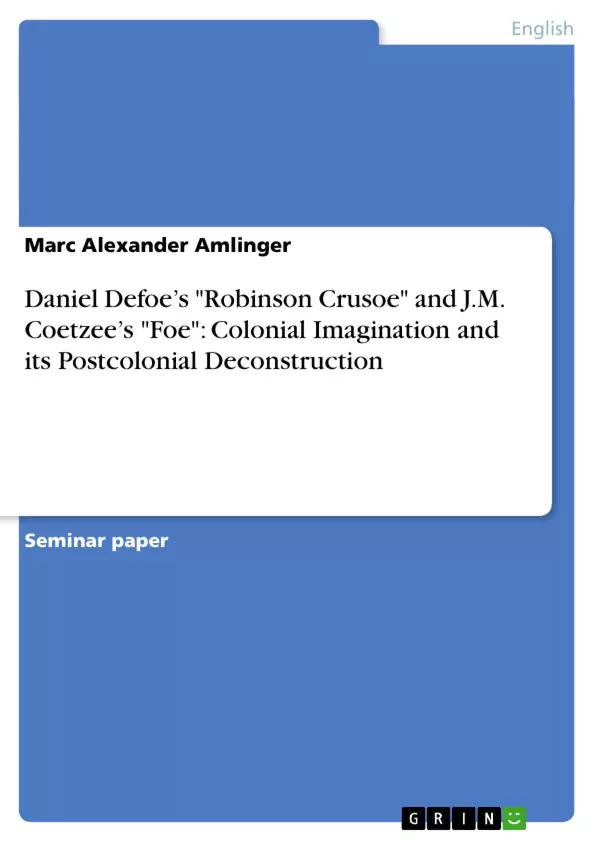Daniel Defoe’s Robinson Crusoe, the tale of a castaway turning his misfortune into a great enterprise, has become more than a famous novel; it has found its place among our cultural heritage. This paper will deal with certain interpretations of the novel that regard the protagonist Crusoe as a classic example of homo economicus, focus on a concept of work that is supposed to underline what is called dignity of labour and construct Crusoe’s island life as an ideal state of natural existence. All these concepts of interpretation that were applied to Defoe’s novel during time share, as conceived here, certain colonial connotations, which are also emphasised by Defoe’s concept of the native colonial subject Friday. Therefore, Defoe’s novel can still be read as a prototype of colonial fiction, mirroring the ideological concerns of the Western imagery on the ‘New World’.
On attempt to deconstruct colonial fiction is the intertextual rereading of Defoe’s Robinson Crusoe by the South African author J.M. Coetzee in his novel Foe. Coetzee’s work itself is here conceived as an attempt to deconstruct the colonial myth that has been implicitly or explicitly attached to the figure of Robinson Crusoe and his story. In regard to Coetzee’s reconception of the English classic the concepts that are illustrated and examined in the first part of this paper, in context of Defoe’s original, will be revised in terms of appropriation of space in colonial fiction, the figure of Crusoe and Friday and the question of the telling of colonial history.
Inhaltsverzeichnis (Table of Contents)
- 1. Introduction
- 2. Daniel Defoe's Robinson Crusoe and its Colonial Connotations
- 2.1 Colonial Space: The Myth of Nature
- 2.2 Labour, Economic Man and the Colony
- 2.3 Friday: The Legitimized Slave
- 3. J. M. Coetzee's Foe and the Postcolonial Deconstruction of the Robinson Myth
- 3.1 Island Spaces and Colonial Appropriation in Robinson Crusoe and Foe
- 3.2 Crusoe and Cruso: The Colonizer in Colonial and Postcolonial Literature
- 3.3 Friday and Friday: The Colonial and Postcolonial Portrait of the Slave
- 3.4 The Telling of Colonial History in Foe
Zielsetzung und Themenschwerpunkte (Objectives and Key Themes)
This paper examines Daniel Defoe's Robinson Crusoe and J.M. Coetzee's Foe, analyzing how the former functions as a prototype of colonial fiction and how the latter deconstructs its colonial myths. The analysis focuses on the colonial connotations embedded in interpretations of Robinson Crusoe and how Coetzee revisits these themes in a postcolonial context.
- Colonial space and the myth of nature in Robinson Crusoe
- The concept of "economic man" and its role in colonial ideology
- The representation of Friday as a legitimized slave
- Coetzee's postcolonial deconstruction of the Robinson myth
- The telling of colonial history in both novels
Zusammenfassung der Kapitel (Chapter Summaries)
Chapter 1: Introduction introduces the topic, highlighting the fame of Robinson Crusoe and its various interpretations, particularly those emphasizing the colonial context and the figure of Friday. It also positions Coetzee's Foe as a postcolonial deconstruction of Defoe's work.
Chapter 2: Daniel Defoe's Robinson Crusoe and its Colonial Connotations discusses the various interpretations of Robinson Crusoe, including the themes of "Back to Nature," "The Dignity of Labour," and "Economic Man." It explores how these themes intertwine with colonial ideology and the representation of Crusoe's relationship with the island and Friday.
Chapter 2.1: Colonial Space: The Myth of Nature examines the interpretation of Crusoe's island life as a "return to nature," challenging the notion that it represents an unbiased state of existence. It argues that Crusoe's actions display colonial exploitation rather than a harmonious integration with nature.
Chapter 2.2: Labour, Economic Man and the Colony (and further chapters) will be added as the provided text is incomplete.
Schlüsselwörter (Keywords)
Robinson Crusoe, Foe, Colonialism, Postcolonialism, Colonial Ideology, Economic Man, Friday, Island, Nature, Decolonization, Intertextuality, Colonial Literature, Postcolonial Literature.
- Arbeit zitieren
- Marc Alexander Amlinger (Autor:in), 2005, Daniel Defoe’s "Robinson Crusoe" and J.M. Coetzee’s "Foe": Colonial Imagination and its Postcolonial Deconstruction , München, GRIN Verlag, https://www.grin.com/document/120711



